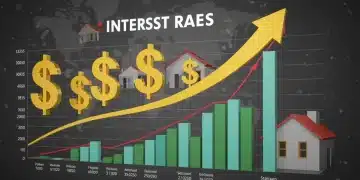Top market responses to Federal Reserve moves impact

Top market responses to Federal Reserve moves impact investors and businesses significantly, influencing strategies based on interest rate changes, market trends, and economic forecasts.
Top market responses to Federal Reserve moves impact the economy in profound ways. But how do these changes actually play out in our daily financial lives? Let’s explore their significance and what it means for you.
Understanding Federal Reserve policies
Understanding Federal Reserve policies is crucial for anyone seeking to navigate the complexities of the financial market. These policies shape the economy in various ways, influencing everything from interest rates to employment levels.
One key aspect of the Federal Reserve’s role is to manage inflation. By adjusting interest rates, the Fed can either encourage borrowing and spending or cool down an overheating economy. This balance is vital for maintaining a stable financial environment.
The Role of Interest Rates
The Federal Reserve uses interest rates as a primary tool for influencing economic activity. When rates are low, it encourages spending and investment. Conversely, higher rates can reduce borrowing and slow down the economy.
- Low interest rates boost consumer spending.
- High rates can lead to decreased loans for businesses.
- Interest rate adjustments are often seen as signals to the market.
Another important policy is the adjustment of reserve requirements for banks. This step can impact the amount of money that banks can lend. By changing these requirements, the Fed effectively manages the liquidity in the financial system.
Open Market Operations
Open market operations involve the buying and selling of government securities. This process directly affects the money supply, impacting confidence in the economy.
- Buying securities injects money into the economy.
- Selling securities takes money out of circulation.
- These operations aim to achieve economic stability.
In summary, understanding Federal Reserve policies helps to decode the signals in the financial market. Regular adjustments to interest rates and reserve requirements, as well as open market operations, play vital roles in influencing economic growth, employment rates, and inflation.
How interest rate changes affect markets
The influence of interest rate changes on markets is significant and wide-ranging. Understanding this relationship can help investors and consumers alike make informed decisions.
When the Federal Reserve raises interest rates, it typically leads to increased borrowing costs. This can slow down economic growth as both consumers and businesses may defer spending and investing. Additionally, higher rates can mean lower stock prices as companies face higher expenses and reduced profits.
The Impact on Consumer Spending
As interest rates rise, consumer loans, including mortgages and car loans, become more expensive. This can lead to a reduction in consumer spending, which is a crucial driver of the economy.
- Higher mortgage rates may deter homebuyers.
- Increased loan costs affect car purchases.
- Credit card rates also climb, impacting everyday expenses.
Conversely, when the Federal Reserve lowers interest rates, borrowing becomes cheaper. This encourages both consumers and businesses to spend more, which can boost economic growth and potentially increase investment in various sectors.
Effects on the Stock Market
Changes in interest rates also influence the stock market. Typically, when rates go up, stock prices tend to fall. Investors often shift their portfolios to seek better returns elsewhere, such as in bonds, which offer higher yields.
- Investors may sell stocks to invest in fixed-income securities.
- Market volatility can increase with rising rates.
- Sector performance varies, with utilities often hit harder.
It is essential to remember that the relationship between interest rate changes and market performance is complex. Many factors impact how the markets react to rate adjustments, such as economic conditions and investor sentiment. Understanding these dynamics gives investors a better picture of potential market behavior.
Market reactions to Federal Reserve announcements

Market reactions to Federal Reserve announcements are pivotal in shaping financial landscapes. Each time the Fed releases statements or makes policy adjustments, investors closely monitor the implications for the economy.
When the Fed hints at changing interest rates, the markets often react immediately. Traders interpret these signals and adjust their portfolios accordingly. For instance, an announcement indicating a potential rate hike can lead to a sell-off in stocks as investors become cautious.
Immediate Market Impact
The stock market typically reacts quickly to Federal Reserve announcements. Positive news, such as a decrease in interest rates, can lead to a surge in stock prices. Investors may feel more confident, resulting in increased buying activity.
- Stocks generally rise after a rate cut announcement.
- Negative news may cause significant market drops.
- Volatility often spikes around announcement dates.
In contrast, when the Fed signals a tightening of monetary policy, there may be fears of slowing growth. This tension can create a ripple effect, causing fluctuations in foreign exchange and bond markets as well. Traders rush to assess risks and reallocate their assets accordingly.
Long-Term Effects
Over the long term, the effects of Federal Reserve announcements shape economic sentiment. Investors analyze not only the immediate reactions but also the broader impact on inflation and growth. Expectations surrounding future policy can lead to shifts in market strategies.
- Long-term bond yields may rise with tightening policies.
- Sector performance can change based on expected Fed actions.
- Market psychology plays a crucial role in reaction patterns.
Understanding how markets react to Fed announcements is critical for all investors. By keeping a close eye on these developments, individuals can make more informed decisions and adjust their investment strategies to align with prevailing economic conditions.
Implications for investors and businesses
The implications of Federal Reserve moves for investors and businesses are significant and can alter strategy in various ways. Understanding these impacts helps stakeholders anticipate changes in the market.
For investors, the adjustments in monetary policy signal how to navigate the financial landscape. When rates rise, stock valuations may decline, prompting a reevaluation of risky assets. Conversely, when interest rates are lowered, it can create a favorable environment for equities, allowing for potential gains.
Investment Strategies
Investors often adjust their portfolios based on projected moves from the Fed. One common strategy involves shifting towards more defensive stocks when an economic slowdown is anticipated. These can provide more stable returns during turbulent periods.
- Invest in utility and consumer staple stocks.
- Consider bonds as interest rates change.
- Look for dividend-paying equities that offer steady income.
Businesses also need to pay close attention to Federal Reserve announcements. Changes in interest rates can affect borrowing costs and influence overall growth strategies. For instance, if rates are expected to rise, companies may rush to secure financing before costs increase.
Cost Management and Planning
Higher interest rates can strain business operations. Companies could face increased expenses on loans and credit, which can lead to cutbacks in hiring or expansion plans. Proper financial planning becomes crucial to navigate these changes.
- Review budgets and reduce discretionary spending.
- Optimize cash flow management to remain nimble.
- Adjust pricing strategies to manage increased costs.
The influence of the Federal Reserve extends beyond immediate financial markets. It shapes long-term strategies for investors and firms alike. Keeping an eye on how these policies evolve ensures better preparation for shifting economic conditions.
Future trends in market responses
Future trends in market responses to Federal Reserve policies will likely depend on various global and domestic factors. As economic conditions evolve, understanding these trends will help investors and analysts make informed decisions.
One key trend is the increasing reliance on technology to analyze market reactions. Advanced algorithms and AI tools are being used to forecast potential market changes based on Federal Reserve announcements. As these technologies advance, they offer more precise insights into market dynamics.
Heightened Market Volatility
Another trend is the potential for heightened volatility in markets. As investors react more rapidly to information and adjust their portfolios in real-time, fluctuations may become more pronounced. For instance, immediate reactions to announcements can lead to significant swings in stock prices and bond yields.
- Rapid trading will make markets more jittery.
- Unexpected Fed decisions may trigger knee-jerk responses.
- Market corrections may happen quickly due to shifts in sentiment.
Additionally, the impact of global events, such as geopolitical tensions or trade agreements, will play a crucial role. These factors can affect how markets respond to Federal Reserve policies. For example, if a crisis arises, even minor adjustments in rates can lead to drastic market reactions.
Focus on Diversification
As market responses continue to evolve, the emphasis on diversification will likely grow among investors. With uncertainty in how markets react to monetary policy changes, spreading investments across multiple sectors may be seen as a safer strategy.
- Investors may favor global diversification to mitigate local risks.
- Sector rotation strategies may become more common.
- Alternative investments like commodities and real estate might gain popularity.
Anticipating future trends in market responses is essential for strategizing in an ever-changing economic landscape. By staying informed about these shifts, investors can adjust their tactics to align better with prevailing market conditions.
In summary, the Federal Reserve’s moves significantly shape market responses and influence both investors and businesses. Understanding these implications allows stakeholders to better anticipate changes in the economic landscape. As the market continues to evolve, keeping an eye on future trends will be vital for making informed decisions. Using technology and diversifying investments can help mitigate risks and take advantage of opportunities as they arise. By staying informed and adaptable, individuals can navigate the complexities of the financial world more successfully.
FAQ – Frequently Asked Questions about Federal Reserve and Market Responses
How do Federal Reserve interest rate changes affect my investments?
Federal Reserve interest rate changes can influence stock prices, also affecting your investment performance. When rates rise, stocks may decline as borrowing costs increase.
What should businesses do in response to changes in Federal Reserve policies?
Businesses should closely monitor Fed announcements and assess how changes may impact borrowing costs and strategic planning for growth or expansion.
What technological trends are influencing market responses to Federal Reserve announcements?
Advanced algorithms and AI tools are increasingly used to analyze market reactions, providing investors with better insights into potential changes following Federal Reserve announcements.
How can diversification protect me from market volatility?
Diversification spreads investments across different assets, which can reduce risk. This strategy helps protect your portfolio from significant losses during periods of market volatility.





